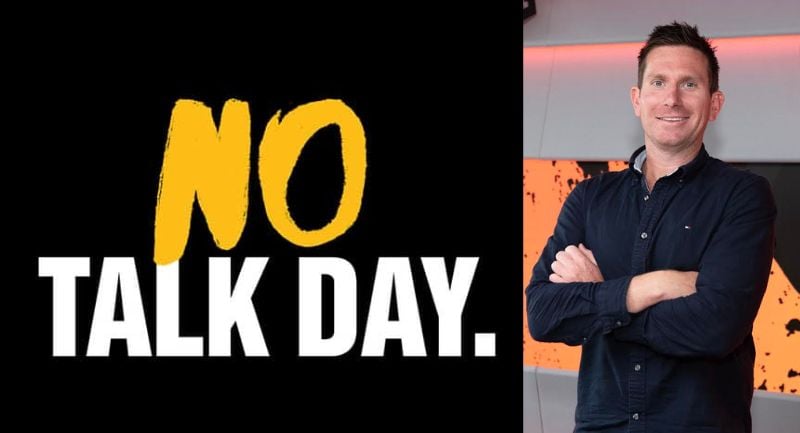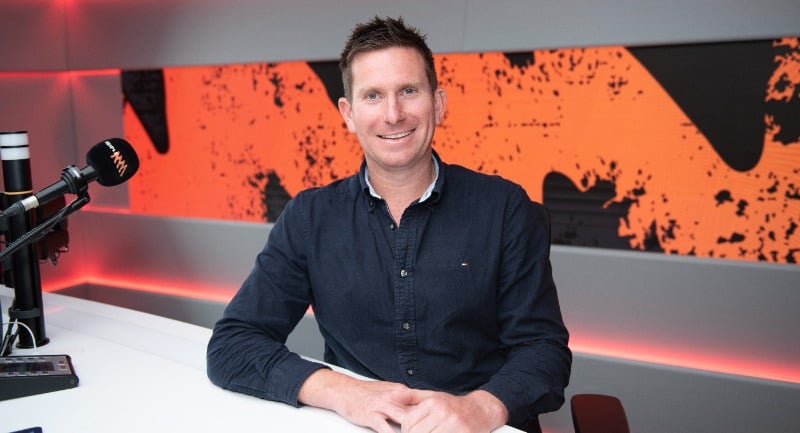Triple M will switch off the mics across its entire network from 6am to 6pm on Monday 7 July for its seventh annual No Talk Day, a campaign designed to create space for Australians to check in on their mental health and each other.
All programming, including shows, news, traffic and advertising, will pause across 49 stations nationally and on the LiSTNR app. Instead, listeners will hear a curated selection of music, messages from listeners, mental health professionals, and some of Triple M’s most recognisable talent reflecting on their own experiences.
The initiative, run in partnership with Lifeline, targets a sobering reality: an average of 8.8 Australians die by suicide every day, with three in four being men. For a brand with a predominantly male audience aged 25 to 54, the cause is personal and persistent.
Mediaweek sat down with Head of Triple M Metro Content Matthew O’Reilly to talk about the initiative.
No shows. No ads. Just space to reflect
Speaking with Mediaweek, O’Reilly said the idea began in Melbourne seven years ago, driven by Mike Fitzpatrick and Shaun Gough, after the team encountered the statistic that six men a day were taking their own lives.
“As a brand that speaks largely to males, 25-55, that was a cause that we thought we needed to support.” O’Reilly said. “We landed on the idea of – if men could have a forum to talk, that would be a great thing. We decided to create the space and run the day.”
Now in its seventh year, the concept has evolved but remains simple: remove the regular noise of radio to make room for reflection, action and conversation.
“There is a little bit of messaging on the day because it would be a miss to just run nothing, but there are no shows, ads, news, traffic. Just music and moments that support the message,” he added.
Carefully curated audio, powerful personal stories
The day’s programming will feature a mix of listener testimonials, messages from Lifeline professionals, and artist stories from the likes of Jimmy Barnes and Bruce Springsteen, woven into the music.
“We’ll run a mixture of some great listener testimonials of people who say that No Talk Day actually saved their life.” O’Reilly said. “It was the instigator for them making change or reaching out to a friend or getting professional help.”
“Lifeline are a partner in the day, so there are some messages from professionals in this space that we run.”
Triple M’s local talent will also share reflections in pre-recorded segments, alongside carefully selected songs aired back-to-back, often without even the usual station IDs.
Why radio hits differently
O’Reilly believes the unique connection between radio hosts and their communities makes the platform especially powerful for mental health messaging.
“For a brand like Triple M, we’re such an irreverent, larrikin, take the piss brand, that when we do something serious like this, it’s a very different tone to 364 other days.” he said. “I think people take notice of that. When you hear people you idolise talking about their own struggles, it really normalises it, makes it easier for people to reach out and start a conversation.”
Operational lift and cultural alignment
Running 49 stations silent across different markets isn’t simple, but O’Reilly said the day is now a well-oiled machine. “Credit to the organisation, we get no pushback from sales, in terms of not running a commercial for the day. It feels like one of those movements the entire business is behind.”
While the campaign falls outside the capital city radio ratings period, O’Reilly says that’s more a logistical consequence than a deliberate choice. “Aligning 49 markets, and needs of all those markets, local events, you are left with very few options to get that day in.”
Promotional efforts ramp up the week before, while the breakfast shows are still on, and including in AFL and NRL coverage.
The messaging is updated annually to reflect current mental health guidance, and the team works closely with Lifeline on framing and tone. Previous years have included symbolic gestures, like six seconds of silence every hour.
“They’re not alone”
Asked what one takeaway he’d want listeners to have, O’Reilly didn’t hesitate: “What I would love is that someone who is struggling, hears the messaging, reaches out to a friend, gets themselves the help they need.”
“They’re not alone.”
Triple M’s No Talk Day airs nationally and on LiSTNR from 6am–6pm Monday 7 July.
For support, contact Lifeline on 13 11 14.

